The exact number of sharks killed each year is unknown due to multiple factors at play, such as overfishing and pollution. However, The International Fund for Animal Welfare (IFAW) states commercial fishing kills over 100 million sharks annually. They also estimate that up to 273 million sharks are killed each year. There are over 500 species of sharks in the ocean, and some of their populations are declining by as much as 99%.
In fact, the IFAW states that extinction or near extinction threatens 50% of shark species. They reported that the pelagic sharks’ population declined by 71% in the past 50 years. Other sharks on the IUCN Red List of Threatened Species list are goblin sharks, basking sharks, hammerhead sharks, and tiger sharks, just to name a few.
Sharks’ decline is staggering, and it is important to work against it because sharks are vital for the overall health of the ocean. The obliteration of 400 million years of evolution just so a restaurant can serve trendy shark fin soup is beyond idiotic — it’s inhuman.
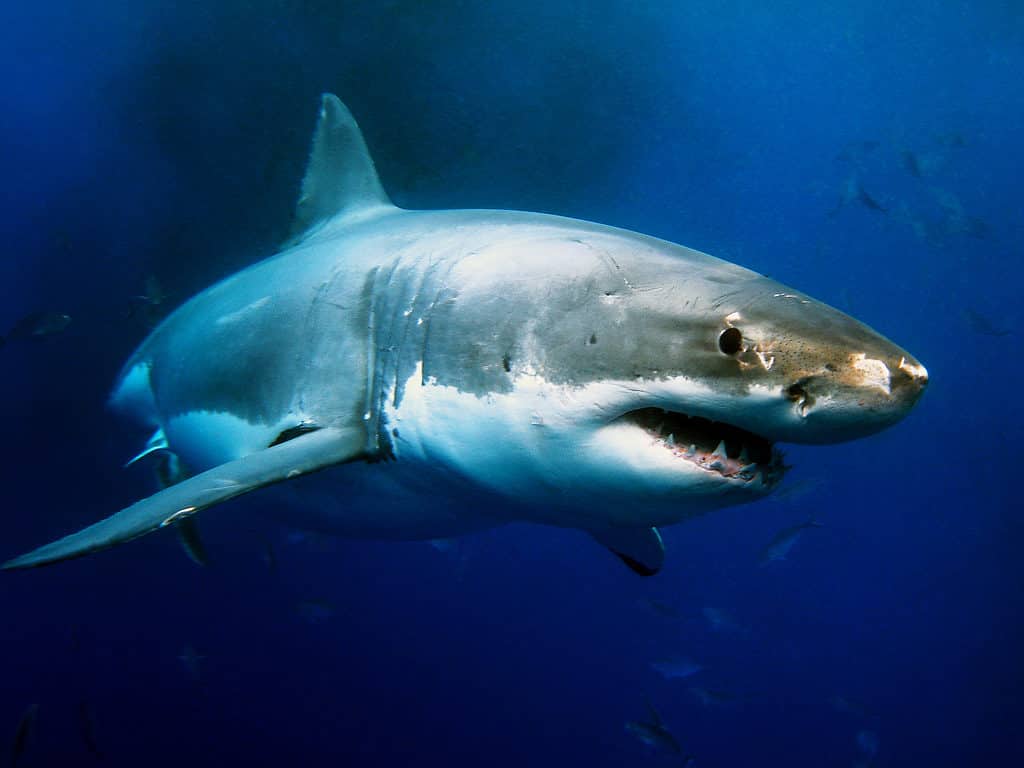
Great white sharks
are the ocean’s apex predators.
©iStock.com/Whitepointer
Quick Facts About Sharks
Sharks are part of the Elasmobranch fish family. Five to seven slits sit at the side of their head for their gills, and their pectoral fins sit on their backs. The 500 species of sharks make up around 14 to 30 shark families. The families split into eight orders: Carcharhiniformes; Hederodotiformes; Hexanchiformes; Lamniformes; Orectolobiformes; Pristiophoriformes; Squaliformes; and Squatiniformes.
Cartilage makes up the majority of the predator’s body. They don’t have any bones, and their skin is like sandpaper because it has small teeth-like structures. Sharks are incredible hunters due to their eyesight. They see clearly in dim areas, so a cloudy ocean is no problem! Sharks become immobile if they flip upside down, so a shark cannot survive if it loses its fins or ability to swim. They are ancient predators, swimming through Earth’s oceans for over 450 million years. However, today, the decline of shark populations is destroying millions of years of evolution due to greed and fear.
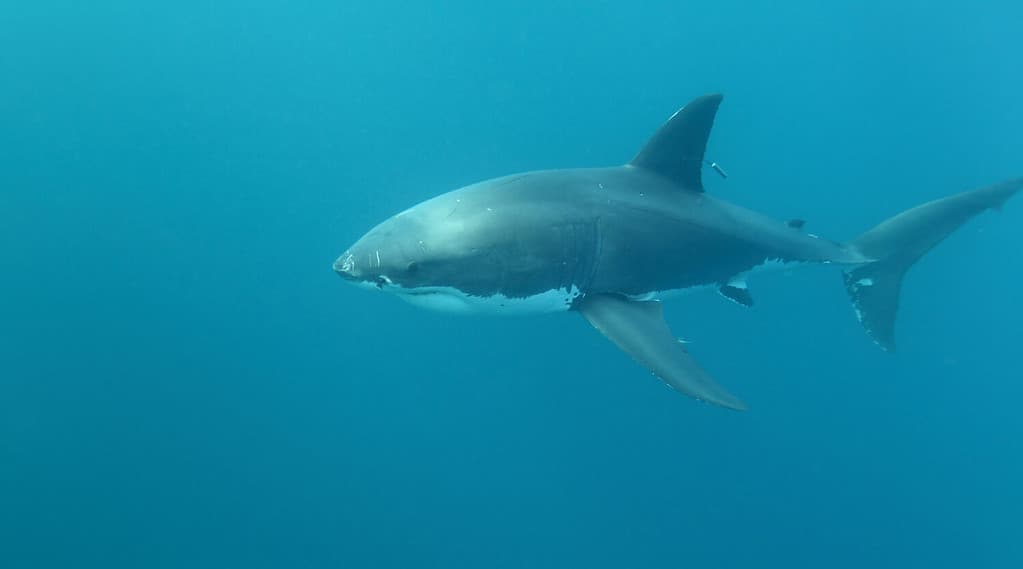
The great white is the largest species. It can reach lengths of about 20 feet and live for 30 years!
©Alessandro De Maddalena/Shutterstock.com
Why Kill Sharks?
“Finners” take the pectoral fins of sharks by slicing them off and leaving the mutilated shark to sink and die a slow and tragic death. Without their fin, sharks cannot swim and suffer from significant blood loss. They starve to death or other fish eat them over time. Because they need to move to force water through their gills for oxygen, most sharks drown.
This horrible finning occurs in Asia as well as places in Europe due to the demand for shark fin soup. It is seen as a delicacy and thought to have several medicinal benefits. Spain, Portugal, the Netherlands, Italy, and France are also significant contributors to the finning market. These countries also make money by importing the fins to places like Hong Kong, Singapore, and Taiwan. Shark finning, and essentially killing, is a global problem and the reason why the disappearance of sharks is so rapid.
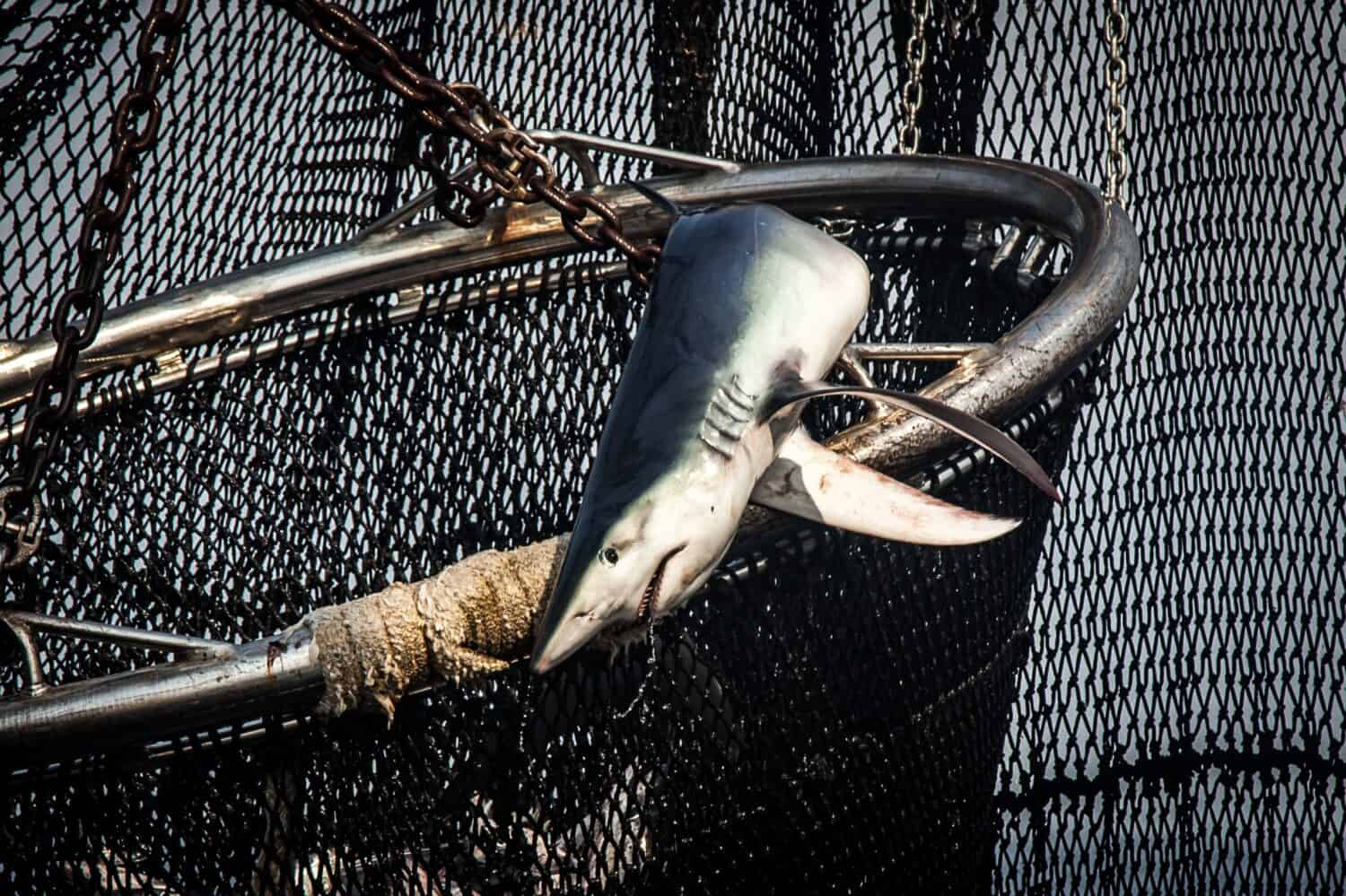
Bycatching occurs when sharks are killed by fishing nets meant for other fish.
©Tara Lambourne/Shutterstock.com
Finning is the biggest threat to sharks. Unfortunately, it is not the only one. Other so-called shark delicacies are decimating the ocean’s population. The shark oil and shark cartilage industry are driving up demand as is the shark meat market. Just like shark fin soup, shark meat is a high-society dish in countries like India, Japan, and Iceland. In fact, fermented shark, kæstur hákarl, is a national dish in Iceland. All of these industries add to the shark’s biggest threat: overfishing.
Why Are Sharks Important to the Ocean
Studies consistently show that sharks are essential for our oceans’ health. The killing (and suffering) of sharks needs to stop. It is an ethical and environmental crisis.
The ocean depends on sharks. Though their fin peaking above the ocean is a sight of terror, the intimidating creatures are a critical part of the marine ecosystem. As apex predators, they regulate species abundance and distribution. This is necessary to maintain the ocean’s delicate and intricate ecosystem. If sharks no longer existed, the results would be catastrophic. The negative effects would rebound into the food chain, seagrass beds, and coral reefs. They are vital to the natural balance of marine ecosystems.
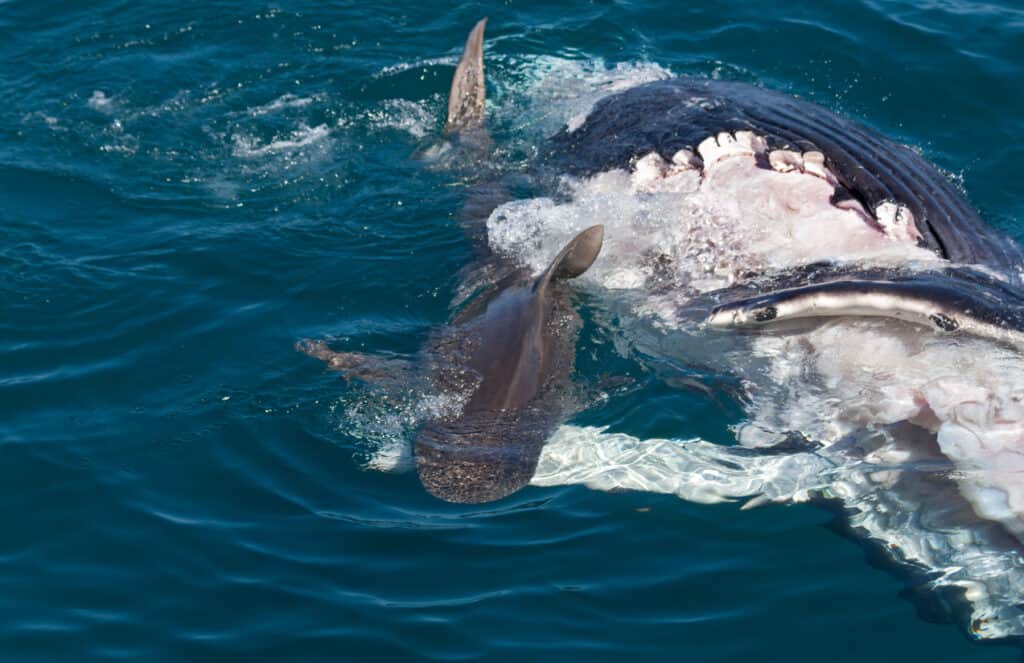
The loss of sharks will affect the entire food chain and throw entire ecosystems off-kilter.
©iStock.com/markrhiggins
If sharks aren’t around to perform their ecological role as predators, species like rays and skates increase to 10 times their normal number. If smaller fish populations spiral out of control, it leads to a depletion of other resources in the ocean. This puts a strain on the food chain because the more rays and skates, the fewer scallops, which means they begin eating clams and oysters. These food sources eat phytoplankton, and this consumption serves as a filtration system to maintain healthy ocean water. If scallop, oyster, and clam populations decline, this filtration system breaks down. Without filtration, the waters develop toxins that are poisonous to bivalves, fish, birds, marine mammals, and even people.
Additionally, if common shark prey like snapper and grouper become too numerous, they will overconsume their food: algae-eating fish. Without enough algae-eating fish, algae will take over the coral reefs, suffocating them.
Sharks Give the Ocean Nutrients
Sharks also move nutrients around the ocean. Shallow ocean waters lack nutrients, and sharks nourish these waters by feeding and defecating. By swimming from deep to shallow waters, the predators enrich the waters with nutrients. The apex predators even help combat climate change by keeping greenhouse gases out of the atmosphere and oceans. An example is tiger sharks scaring sea turtles away from underwater seagrass meadows. This prevents the turtles from overgrazing and in turn, keeps more carbon in the ocean and out of the atmosphere. If shark numbers plummet and turtles deplete the seagrass, carbon isn’t sucked out of the atmosphere, and global warming quickens.
How Can We Help Sharks
Sharks are essential in many ways, and it is our job to keep them in the oceans! Legislation to ban eating sharks is essential. Losing sharks is ecologically irresponsible and killing sharks is morally corrupt and greedy.
Shark Mandates
The United States has some of the strongest shark mandates in the world. The Shark Finning Prohibition Act of 2000 prohibits anyone under U.S. jurisdiction from engaging in the finning of sharks, possessing shark fins on their fishing vessel (without the shark body), and landing shark fins without the shark’s body. The act also requires NOAA Fisheries to provide Congress an annual report describing how they implement the law.
On Jan. 4, 2011, Congress signed the Shark Conservation Act of 2010 into law. It requires that all sharks in the United States, with one exception, be brought to shore with their fins naturally attached.
These mandates and legislation help sharks, but you can also do your part. Here are some tips:
Educated Yourself
The more you know about sharks, the more you can educate others about their importance. The more people that are aware of the dangers to sharks and how we need them in our waters, the better.
Don’t Buy Shark Products
This tip speaks for itself. The less demand for shark fin and meat, the fewer sharks get killed. Also, shark products like oil and cartilage are big scams when it comes to health benefits.
Reduce Your Seafood Consumption
Commercial fishing also negatively impacts sharks. It reduces their food sources and sharks are often killed as bycatch. Since sharks are attracted to the movement of other fish, trapped animals are a dream for them. They may try to feed on fish and mammals caught in a net and then end up getting caught and strangling themselves.
Reduce, Reuse, Recycle
Another obvious threat to the predators is pollution. Any little bit helps, so if you can join a beach clean-up or use a reusable bag or water bottle, you are doing your part!
Go Diving with Sharks
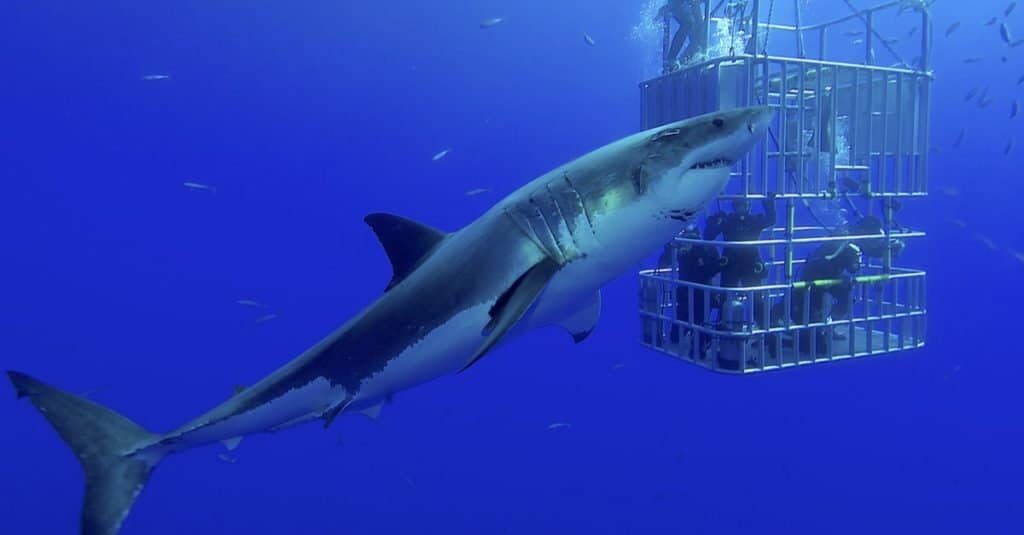
Shark diving is a revenue stream that helps protect sharks.
©Stefan Pircher/Shutterstock.com
Government and local business owners are more likely to protect sharks if they know they will bring in revenue. Shark diving is the perfect attraction! Shark tourism supports local conversation efforts and local economies.
You can also write to local politicians to voice your concerns and donate or volunteer with conservation organizations to do your part as well.
Sharks are vital to the oceans and the oceans are vital to life on land. Anything we can do to help the conservation effort is a step in the right direction.
The photo featured at the top of this post is © iStock.com/ShaneMyersPhoto
Thank you for reading! Have some feedback for us? Contact the AZ Animals editorial team.






